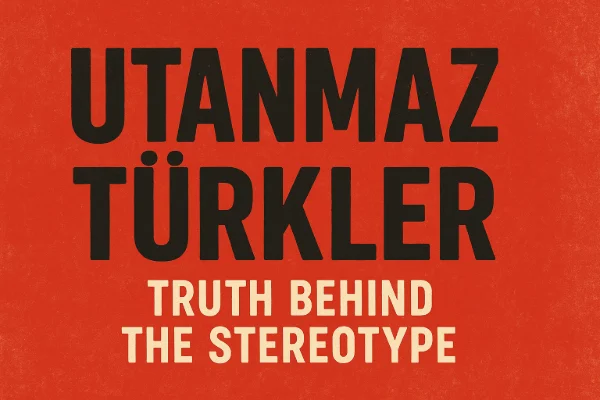Introduction
The phrase “utanmaz türklere” means “to shameless Turks” and is often used negatively. It reflects misunderstandings and stereotypes about Turkish culture. This article explains the phrase’s meaning, cultural background, and why it’s important to avoid unfair generalizations.
What Does “Utanmaz Türklere” Mean?
Literal Translation
“Utanmaz” means shameless, and “Türklere” means to Turks. Combined, it’s a derogatory expression implying an entire group lacks manners.
Why It’s Offensive
In Turkish society, being called “shameless” is deeply insulting. Honor, respect, and social image are important values in daily life.
The Cultural Puzzle of Turkey
A Unique Crossroad
Turkey sits between Europe and Asia, blending modernity with tradition. Its culture can be vibrant, loud, and passionate—often misread by outsiders.
Why Confusion Happens
Social behavior in Turkey can differ from Western norms. What seems rude in one culture may be perfectly normal in another.
Common Cultural Misunderstandings
Misread Behaviors
Some Turkish behaviors confuse visitors. Here’s a breakdown of actions often misinterpreted:
Misunderstood Behaviors
| Behavior | Western View | Turkish Meaning |
| Loud speech | Rude or aggressive | Expressiveness |
| No “sorry” | Insensitive | Often shown through gestures |
| Cutting in line | Disrespect | Prioritizing elderly or quick service |
| Close contact | Invading space | Normal in dense cities |
The Power of Stereotypes
Mental Shortcuts
Stereotypes simplify complex societies. “Utanmaz Türklere” is one such damaging generalization.
Overshadowing Diversity
Turkey has 85+ million people of diverse backgrounds. Reducing all Turks to one label dismisses their individuality.
Hospitality: The Heart of Turkish Culture
What Visitors Often Miss
Turks are known for their hospitality. Guests are offered tea, food, and warm conversation—even by strangers.
Everyday Etiquette
Turkish customs include removing shoes at home, using respectful language, and treating elders with care.
Social Media: Fuel for Misunderstandings
Viral Outrage
One bad travel story can spread across TikTok or Reddit, tagged with phrases like “utanmaz Türklere.”
Confirmation Bias Online
Users often believe stories that match their assumptions—even if the full context is missing.
Respect and Etiquette Differences
East Meets West Expectations
Cultural etiquette differs widely. Here’s how Turkish norms contrast with Western expectations:
Cultural Etiquette Overview
| Western Norm | Turkish Equivalent | Cultural Insight |
| Formal queues | Flexible lines | Priority to elders or urgency |
| Apologizing often | Rarely verbal | Shown by gestures |
| Reserved speech | Open expression | Seen as warmth and honesty |
| Limited touch | Friendly physical contact | Cheek kissing is common |
What Is “Utanmaz Türklere”?
“Utanmaz Türklere” means “to/about shameless Turks.” It’s an offensive phrase often used by outsiders who misunderstand cultural behavior. It reflects frustration, not facts, and promotes harmful stereotypes.
Bridging Cultural Gaps
For Tourists
Learn basic phrases like “merhaba” (hello) and “teşekkür ederim” (thank you). Observe and adapt to local customs before judging.
For Locals
A little explanation goes a long way. Calmly correcting misunderstandings helps build mutual respect.
Historical Use of Shame in Turkish Culture
Importance of Honor (Namus)
In Turkish culture, honor and shame (namus and ayıp) are deeply ingrained values, especially in more conservative or rural communities. Calling someone “utanmaz” (shameless) is a serious accusation, far heavier than in many Western contexts. It’s not merely about bad manners—it can imply dishonor to one’s family or lineage.
Legacy of Ottoman Etiquette
The Ottoman Empire cultivated a tradition of refined manners called adab. Certain gestures, language, and social decorum were markers of one’s upbringing. The loss or disregard for these customs today is sometimes criticized within Turkey itself, which might lead to locals labeling others as “utanmaz” in frustration—not just foreigners.
Regional Variations in Behavior
Istanbul vs. Anatolia
Behavioral expectations can vary greatly:
- In Istanbul, urban norms are fast-paced and modern. People might push in public transportation or raise their voices more often.
- In Anatolian towns, hospitality and modesty are emphasized. Calling someone “utanmaz” here can damage reputations for life.
Kurdish and Arab-Turkish Communities
In southeast Turkey, cultural expressions differ even more due to ethnic diversity. Behaviors like indirect speech, deference to elders, and strong family bonds are more pronounced. Foreigners who don’t grasp these dynamics might wrongly label someone as rude or shameless.
Linguistic Roots of “Utanmaz”
The word “utanmaz” is derived from the verb “utanmak” (to feel ashamed or embarrassed). The suffix -maz makes it negative, so “utanmaz” means “one who does not feel shame.”
- Utanmak is used in both private and public contexts.
- In literature and folk tales, “utanmak” is a key theme tied to morality and upbringing.
How Turkish Media Addresses These Stereotypes
TV and Cinema
Popular Turkish TV series like Ezel, Diriliş: Ertuğrul, and Kurtlar Vadisi portray exaggerated heroism, pride, and strong emotions. Foreign audiences who watch these shows might misinterpret Turkish people as overly dramatic or aggressive, reinforcing stereotypes like those implied by “utanmaz Türklere.”
Comedy and Satire
Turkish comedians like Cem Yılmaz often joke about national quirks, including “rudeness,” traffic chaos, or aggressive bargaining styles—but always from an insider’s lens. When foreigners echo these jokes without understanding the context, it can feel disrespectful.
Examples of Phrases Similar to “Utanmaz Türklere”
Here are other expressions that reflect a similar emotional tone or stereotype, either within Turkey or about other cultures:
| Expression | Language | Meaning | Use Case |
| Ayıp ettin | Turkish | You did something shameful | Mild rebuke |
| Gavurun dölü | Turkish | Child of an infidel | Deeply offensive slur |
| Filthy Gaijin | Japanese-English | Foreigner (derogatory) | Used in xenophobic contexts |
| Les Français arrogants | French-English | Arrogant French | Stereotype about French behavior |
| Loud Americans | Global English | Stereotype about U.S. tourists | Often used humorously |
Psychological Insight: Why We Label
From a psychological standpoint, using a term like “utanmaz Türklere” reflects in-group/out-group bias. People feel safer when they label others as “different,” especially in unfamiliar environments.
This can stem from:
- Culture shock
- Language barriers
- Projection of frustration
Rather than processing complexity, people resort to oversimplified judgments.
Learn More About Turkish Culture
For deeper insight into Turkish society, customs, and traditions, explore the Culture of Turkey on Wikipedia. It offers valuable historical and social context.
The Bigger Picture
Words Can Harm
Using phrases like “utanmaz türklere” fuels division. They reduce a rich culture to a single, unfair label.
Choose Curiosity Over Judgment
Cultural differences should spark interest—not insults. One rude experience doesn’t define a whole nation.
Conclusion:
Turks are diverse, proud, and culturally rich. The phrase “utanmaz türklere” unfairly stereotypes millions based on misunderstandings. Whether you’re a visitor or a local, your approach matters. Practice empathy. Be open. Choose kindness over criticism. In a world growing more connected by the day, mutual understanding is not just polite—it’s essential.





